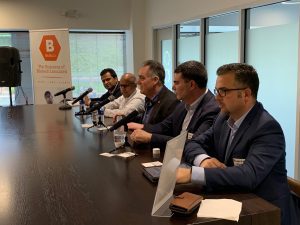
NCBiotech-Backed Workforce Development Programs Provide Avenues for Employment in RTP
By Alex Keown
April 25, 2023
Two N.C. workforce development programs backed by the North Carolina Biotechnology Center (NCBiotech) have been designed to provide pathways for youths and for military veterans to meaningful employment in the state’s thriving life sciences ecosystem.
For military veterans and their spouses, the Military Service Members in Biopharma Manufacturing (MSMBM) program offers tuition that will support earning manufacturing certifications, including a N.C. BioWork certificate. The certificate program is aimed at individuals with a broad range of educational background and career goals, including those just out of high school or looking to transition into a new industry. MSMBM is open to those who actively serve in the military, veterans and their spouses.
Financing for MSMBM, which was enabled through a National Institute for Innovation in Manufacturing Biopharmaceuticals (NIIMBL) grant, allows participants to complete an eight week training program to earn a BioWork certificate. The certification can be earned at various community colleges throughout the Research Triangle Park area, including Durham Technical Community College and Central Community College in Sanford. The BioWork certificate provides the students with the skills and education necessary to find entry-level employment in biotechnology, pharmaceutical, or chemical manufacturing. Students will gain experience in areas such as equipment processing and quality control.
The MSMBM is a pilot program that launched last year in both Texas and North Carolina, where it is supported by NCBiotech, the Tar Heel State’s life sciences economic development organization. With multiple military bases across the state, including Fort Bragg, Camp Lejeune and Seymour Johnson Air Force Base, North Carolina is home to a significant military presence. It is estimated that more than 736,000 veterans live in North Carolina, representing 9.8% of the state’s total population.
The RTP program is similar to another veteran-aimed initiative in Maryland, a partnership between BioHub Maryland, a Maryland Tech Council initiative, and the not-for-profit Platoon 22. That program provides veterans with a new career pathway in the life sciences by teaching industry fundamentals, which include biomanufacturing concepts, cell and gene therapy and vaccine manufacturing fundamentals, quality control skills, technical writing, and data analysis.
In addition to the MSMBM, NCBiotech also supports other workforce development initiatives, including the Build Up Local Life Sciences (BULLS) Academy. Established in 2020 during the height of the COVID-19 pandemic, the BULLS initiative was launched to provide a new career pathway for those who were displaced due to job loss, as well as for people from under-represented backgrounds. The goal was to connect these people with high-growth and high-wage opportunities with life sciences organizations in Durham, which is home to about half of the companies in Research Triangle Park.
The BULLS Academy is financially supported by Durham County. It will also receive support from a federal grant through the Build Back Better program. Last year, a coalition of North Carolina life sciences organizations received $25 million in backing from the U.S. Economic Development Administration’s Build Back Better Regional Challenge. The training program was one of only 21 projects backed by the Phase 2 federal award.
“This award will enable us to attract and develop a more diverse workforce to manufacture vaccines, gene and cell therapies, antibodies, and other medicines. Enabling greater equity for our underserved populations as well as those in distressed and rural communities is essential,” Bill Bullock, NCBiotech’s senior vice president for economic development and statewide operations, said at the time of the announcement.
Participants in the BULLS Academy are required to have a high school diploma or the equivalent, be a Durham County resident and be 18 to 24 years old. Students accepted into the academy are eligible for a $10,000 stipend that can cover living expenses during the 17 week program. The academy provides training in three primary areas, Good Manufacturing Practices and Standard Operating Procedures; BioWork; and Bio Certification review. BULLS Academy coursework will lead to earning the BioWorks certificate and a potential job in the industry.
According to WRAL, four cohorts have completed through the academy since it first launched. In all, 58 students have graduated from the BULLS Academy. A fifth cohort started in February 2023 and is expected to complete the academy in June.






